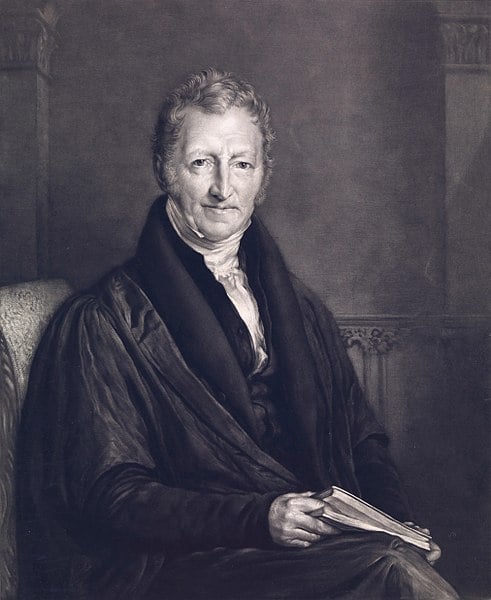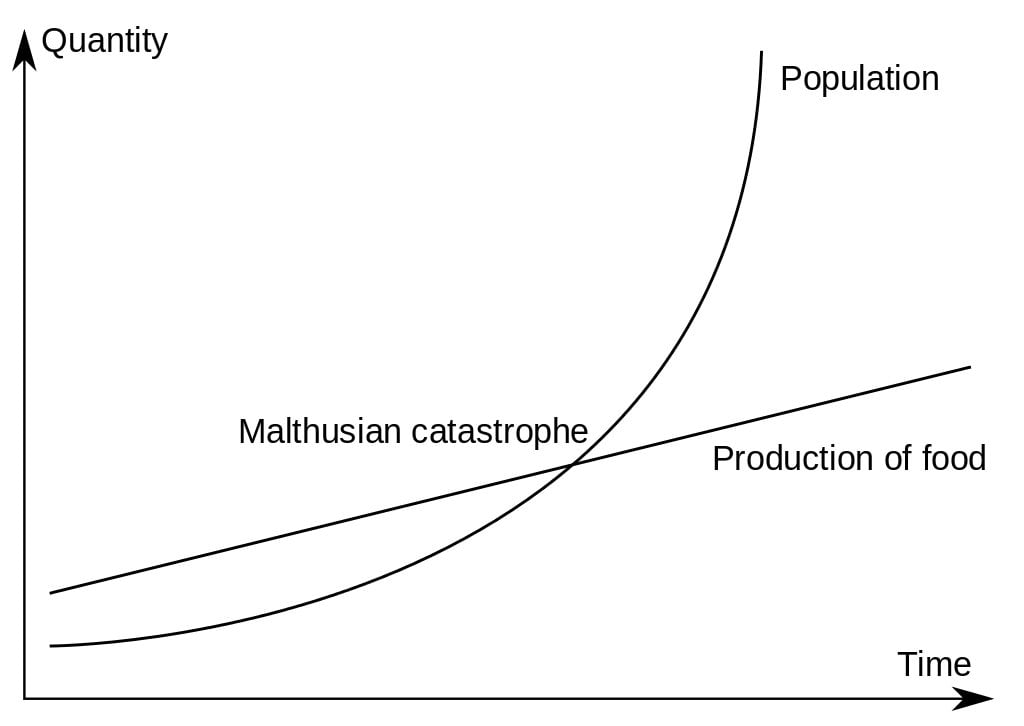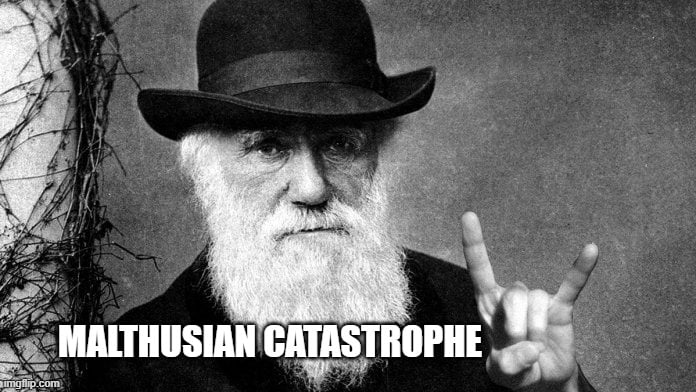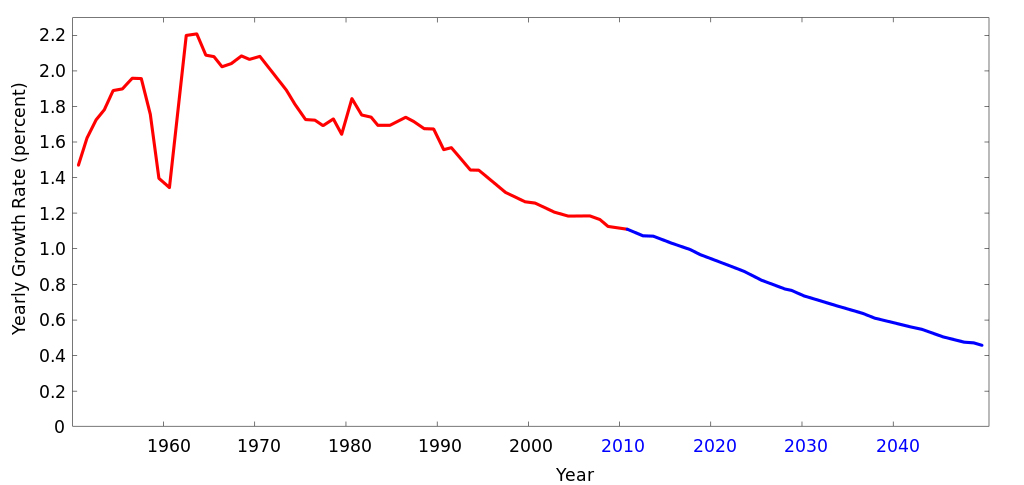Malthus opined that population growth would be geometric whereas food resources would only grow in arithmetic progression. And at some point, population growth would overwhelm agricultural output, putting the crisis of limited supply of food for the sea of mouths to feed.
Whenever a child is born, the new parents and the rest of the family are often in a state of ecstasy, as a new member joins the clan. To experience the entrance of a new life into one’s family is a joyful moment that is difficult to describe.

However, a few economists have a dissenting outlook on procreation. When it comes to economists talking about demographics, one of the first names that come to mind is that of Thomas Malthus, who had a decidedly grim outlook on the rising birth rates of humanity.

Recommended Video for you:
What Is Malthusian Catastrophe?
In his seminal book An Essay on the Principle of Population, first published in 1798, Thomas Robert Malthus predicted a grim future based on his theory, which is popularly referred to as the Malthusian Catastrophe. A Malthusian catastrophe—also called a Malthusian check, Malthusian specter and the Malthusian crunch—is a prediction that a growing population will soon outpace the planet’s agricultural production capacity. In other words, at some point in the near future, there will be far too many people and too limited a food supply, leading to great unrest.

Malthus was of the opinion that the growth of the human population is geometric, whereas food production would grow arithmetically, which would ultimately lead to famine and starvation, lest the births be controlled in some way.
Some of you may need a refresher on geometric and arithmetic progression to understand Malthusianism better. Here it is:
A geometric progression refers to the mathematical sequence of numbers wherein each term (number) after the first term is derived by multiplying the previous term by a (positive) integer called the common ratio. An example of a geometric sequence:
3, 9, 27, 81, 243
Here the common ratio is 3. Subsequent numbers after ‘3’ in the above sequence are obtained by multiplying with 3 (the common ratio).
Arithmetic progression, on the other hand, is the mathematical sequence wherein there is a constant difference between consecutive terms. For example, an arithmetic sequence would be something like:
4, 7, 10, 13, 16, 19
Here the common difference is also 3. You see, when you subtract the next term by the previous term, the difference (‘3’ in this case) remains constant throughout.
Now, coming back to the Malthusian Catastrophe, Malthus opined that population growth would be geometric, i.e., growing rapidly over time, whereas food resources would only grow in an arithmetic (or linear) progression. At some point, population growth would overwhelm agricultural output, creating the crisis of a limited supply of food for the sea of mouths to feed.
Malthus argued that the short-term gains of an improved standard of living would soon be undermined as human population growth would exceed the production capacity of food, forcing the living standard back to mere subsistence.

Preventive And Positive
Malthus believed two types of population checks could defer such a Malthusian catastrophe: preventive and positive.
A preventive check is one in which people make the voluntary decision to delay marriage and abstain from mating or procreation, citing the lack of resources for future generations to survive. Malthus felt that humans could not simply turn a blind eye to the consequences of uncontrolled population growth and would need to take voluntary actions to keep population growth under control.
A positive check, on the other hand, is an event or condition that shortens the life span of human beings through something drastic, such as wars, epidemics, pandemics, floods, famine, etc. Malthus also included poor health and economic conditions as a part of positive checks.

Proponents Of Malthusian Thought
Malthusianism influenced the work of two famous biologists, Charles Darwin and Alfred Russel Wallace. Darwin acknowledged Malthus as a great philosopher and felt that the increase in food through artificial methods was not possible, nor was the voluntary practice of celibacy or birth control feasible. Wallace felt that An Essay on the Principle of Population (the book in which Malthus proposed the theory of Malthusian Catastrophe) was one of the most important books he ever read, and successfully addressed many of the key problems of philosophical biology.

Problems With Malthusianism
Economists and critiques of Malthusian Catastrophe have long contended that food can indeed grow geometrically. For the past two centuries, many scientists have argued that Malthus overlooked technological advancement, which would allow humans to stay ahead of the population curve. Food production can also grow in geometric proportions because it is not only about the land, but also about the scientific and technological know-how to utilize the land more efficiently. Advances like seed breeding, soil nutrient replenishment, irrigation, and agriculture mechanization are some of the examples that serve as a good advocate for this claim. Furthermore, the advances in technology in other sectors, such as energy, manufacturing, transport, communications, etc. could help to keep food production on par with the surging population.
Another important element that Malthus failed to factor in was demographic transition, wherein population growth trajectory would cease to grow in geometric progression. In such a demographic transition, societies move from a state of high fertility rates (roughly offset by a high mortality rate) to a state of low fertility rates (accompanied by a low mortality rate).
Malthus failed to foresee advancements in the public health system, the imposition of strict family planning policies by governments, and modern contraception, all of which could result in a dramatic decline in the population growth rate.

How Have We Fared With This Malthusian Portending?
Back in my college years, when we used to study social science, our economics professor mocked Malthusian reasoning. He once said that a Malthusian Catastrophe is a classic example of a naïve forecast gone wild. He argued that it has been more than 200 years since he first proposed this idea and the population has catapulted from 800 million back then to around 7 billion today, yet we haven’t witnessed the “subsistence crisis” predicted by Malthus.
Eminent economists like Karl Marx and Henry George were amongst the early critics of Malthus’s work. George argued that humans are distinct from other species, and can use their brains to leverage even the reproductive forces of nature to their advantage, unlike any other animal. He justified this argument by giving an example of the Jayhawk. George noted that both the Jayhawk and humans eat chickens, but if there are more Jayhawks, there would be fewer chickens. However, if there are more men, there won’t be fewer chickens, as humans, through ingenious methods like poultry farming, would scale up the breeding of chickens to match the rising demand.
As mentioned earlier, Malthus probably couldn’t account for technological advancement that humanity has been able to achieve, which has facilitated us to substantially improve agricultural and food output. In fact, our increase in know-how is not just about getting more output from the same input, but also about exploring new avenues for input.
Industrial Revolution
Watt’s steam engine ushered in the era of the Industrial Revolution, wherein humans mastered the art of using fossil fuels (specifically coal) to power industries. Subsequently, we have discovered methods to harness other forms of energy like oil and gas, electricity, wind, etc. In the last few decades, we have learned to dig deeper in our quest for minerals and precious metals, developed methods to fish with larger nets in the vast oceanic water, discovered ways to divert and control rivers by building dams and canals. In innumerable ways, we have cleverly gotten not just more for less, but also more for more, as we discovered ways to harness power from natural capital to fuel our consumption and thereby improve our living standards.
Green Revolution
Through the Green Revolution, following the second World War, we have mechanized agriculture, which has dramatically bolstered our proceeds from farmland. The Green Revolution has substantially improved crop yield, expanding our food supply and helping to reduce food prices. Thanks to the Green Revolution and other advancements in technology, our food production thus far has mostly stayed ahead of the population growth.
The Population Growth Rate Is Declining
According to Stewart Brand, the editor of Whole Earth Catalogue magazine, Malthusian wariness has been proven wrong since 1963, when the population growth rate peaked, after which it has consistently declined. According to Brand, 1963 was an inflection point, wherein the purported “J-curve” of human population explosion prognosticated by Malthus and his ilk ceased to be true, as the population growth rate lost steam. Although population is increasing, it is doing so at a slower pace, and we aren’t staring down an imminent food crisis.

Covid19 Pandemic: A Sign Of Malthusian Catastrophe?
Supporters of Malthusian theory argue that Malthus was actually right in many ways. His warnings of “positive checks”, wherein wars and pandemics wipe off big chunks of the population as nature’s way of maintaining balance have turned out to be true. Deaths of millions of people during the two major World Wars are examples they cite to back their stance. Also, many claim that the Spanish flu epidemic, which wiped off nearly 1% of the world’s population, was also nature’s positive check. Similarly, the ongoing coronavirus, i.e., the Covid-19 pandemic, is perceived to be part of a positive check by many, which Malthus predicted would take place to keep the population under control to prevent any overwhelming of the food and other resources on the planet.

That being said, the actual catastrophe that he felt was imminent didn’t really materialize. Despite over 200 years having passed since the time he presaged the catastrophe, the world population has remained below the dangerous levels that he reckoned would soon be surpassed. Simultaneously, world hunger has been on a steady decline. According to the United Nations projection, the present population growth rate is sustainable for at least another century, considering our present technological advancements. So, while his supporters can argue that the positive check, as portended by Malthus, are coming true, the actual “catastrophe” that he warned about isn’t truly imminent.
References (click to expand)
- (2001) Can South Africa Avoid a Malthusian Positive Check? - jstor. JSTOR
- Klyve, D. (2013, August 15). Darwin, Malthus, Süssmilch, and Euler: The Ultimate Origin of the Motivation for the Theory of Natural Selection. Journal of the History of Biology. Springer Science and Business Media LLC.
- WORLD POPULATION TO 2300 - esa













